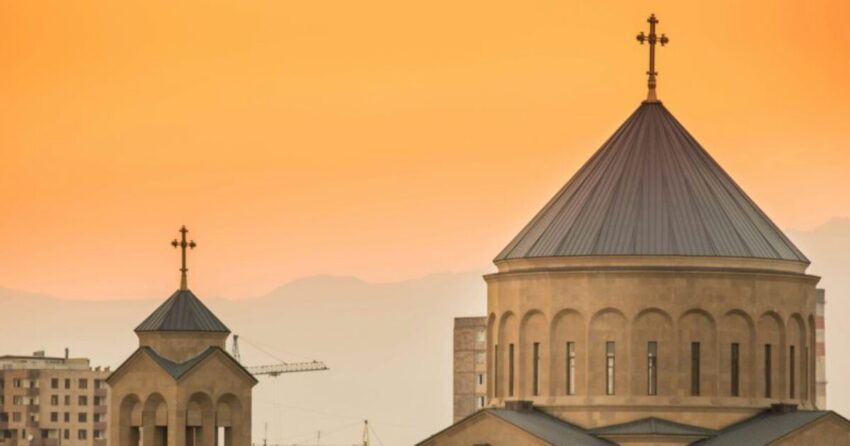
An allegation of sexual impropriety poured fuel on the fire of a massive political feud in the world’s oldest Christian nation, entangling a prime minister, top church clergy, and even a billionaire businessman.
The feud began in May when Armenian Prime Minister Nikol Pashinyan accused apostolic church head Catholicos Karekin II of secretly fathering a child. As Armenia’s Apostolic Church pushed back on the allegations, tensions only escalated, leading to mass arrests of clergy members and allegations of a planned coup in June.
Included in the arrests was one of Armenia’s richest men, Samvel Karapetyan, who had previously accused the prime minister of openly persecuting the nation’s preeminent religious institution.
“Our religion is very peaceful, and taking bishops to jail is not what we want, in the 21st century, in our country,” Narek Karapetyan, Samvel’s nephew and director of Tashir Capital, told the Daily Caller News Foundation. “It’s a religious freedom problem for us.”
The Armenian Ministry of Foreign Affairs did not respond to the DCNF’s request for comment.
Samvel Karapetyan recorded a video on June 17 calling out a “small group” of individuals who “have forgotten the thousand-year history of Armenia and the church,” which was seen by many as a dig at the Armenian prime minister and his church crackdown, according to The Associated Press. The video was released days after Pashinyan called for Karekin II to resign as head of the Armenian church.
“I have always stood with the Armenian Church and the Armenian people,” the billionaire said. “If the politicians do not succeed, we will intervene in our own way in this campaign against the church.”
On the same day Karapetyan made the post, he was arrested by government forces and his house was raided, according to the AP. The prime minister also promised to nationalize Karapetyan’s company, Electric Networks of Armenia.
Karapetyan is worth an estimated $4.4 billion, amassing his fortune from Russia-based Tashir Group, his real estate development company, and his electric company, which supplies most of Armenia’s electricity.
Roughly a month after Samvel Karapetyan’s initial detention, a judge in the Armenian Court of Criminal Appeals ruled in August that his arrest was unlawful, according to OC Media, a Caucasus-based news agency. However, the government has vowed to appeal the ruling.
“It’s not an authoritarian country, and such an undemocratic step from our prime minister’s side was a shock,” Narek Karapetyan told the DCNF.
The Armenian Apostolic Church was founded in 380 A.D., when the nation became the first in world history to adopt Christianity as the state religion. According to church tradition, the apostles Bartholomew and Jude evangelized the nation after Jesus’ death and resurrection.
The church has been an integral part of the Armenian identity for centuries, Narek Karapetyan told the DCNF. It remains popular among the citizenry, as 58% of respondents said they were satisfied with the institution in a poll from the International Republican Institute taken in July.
The tensions between the church and the government gained new life around 2018 when the prime minister came to power, and ramped up significantly after 2020, according to OC Media. Pashinyan was elected prime minister after the Velvet Revolution in 2018, where former Prime Minister Serzh Sargsyan stepped down amid mass protests against the government.
In the wake of the revolution, some of the ire of the people also turned towards the church, with calls for the resignation of Karekin II following shortly after Pashinyan’s ascension to power, according to OC Media.
In the midst of the Nagorno-Karabakh war in 2020 between Armenia and Azerbaijan, a war over the aforementioned disputed territory, church prelates continued to criticize the government for its handling of the conflict, according to the outlet.
Archbishop Bagrat Galstanyan, the prelate of the Tavush Province, arrested for allegedly inciting insurrection, led protests against the government on behalf of his province, whose borders were heavily redrawn between Azerbaijan and Armenia, swapping various territories around the border.
The protests, dubbed “Holy Struggle,” were officially described by Galstanyan as non-political, but rallies often called for the prime minister’s resignation and served as a hub for opposition to the government. The movement received a blessing from Karekin II.
“For Armenians, Christianity is not just a religion, but it’s our culture, it’s our everything for us,” Narek Karapetyan told the DCNF. “It has been for over 1,700 years.”
All republished articles must include our logo, our reporter’s byline, and their DCNF affiliation. For any questions about our guidelines or partnering with us, please contact [email protected].
Click this link for the original source of this article.
Author: Wallace White
This content is courtesy of, and owned and copyrighted by, https://www.bizpacreview.com and its author. This content is made available by use of the public RSS feed offered by the host site and is used for educational purposes only. If you are the author or represent the host site and would like this content removed now and in the future, please contact USSANews.com using the email address in the Contact page found in the website menu.





